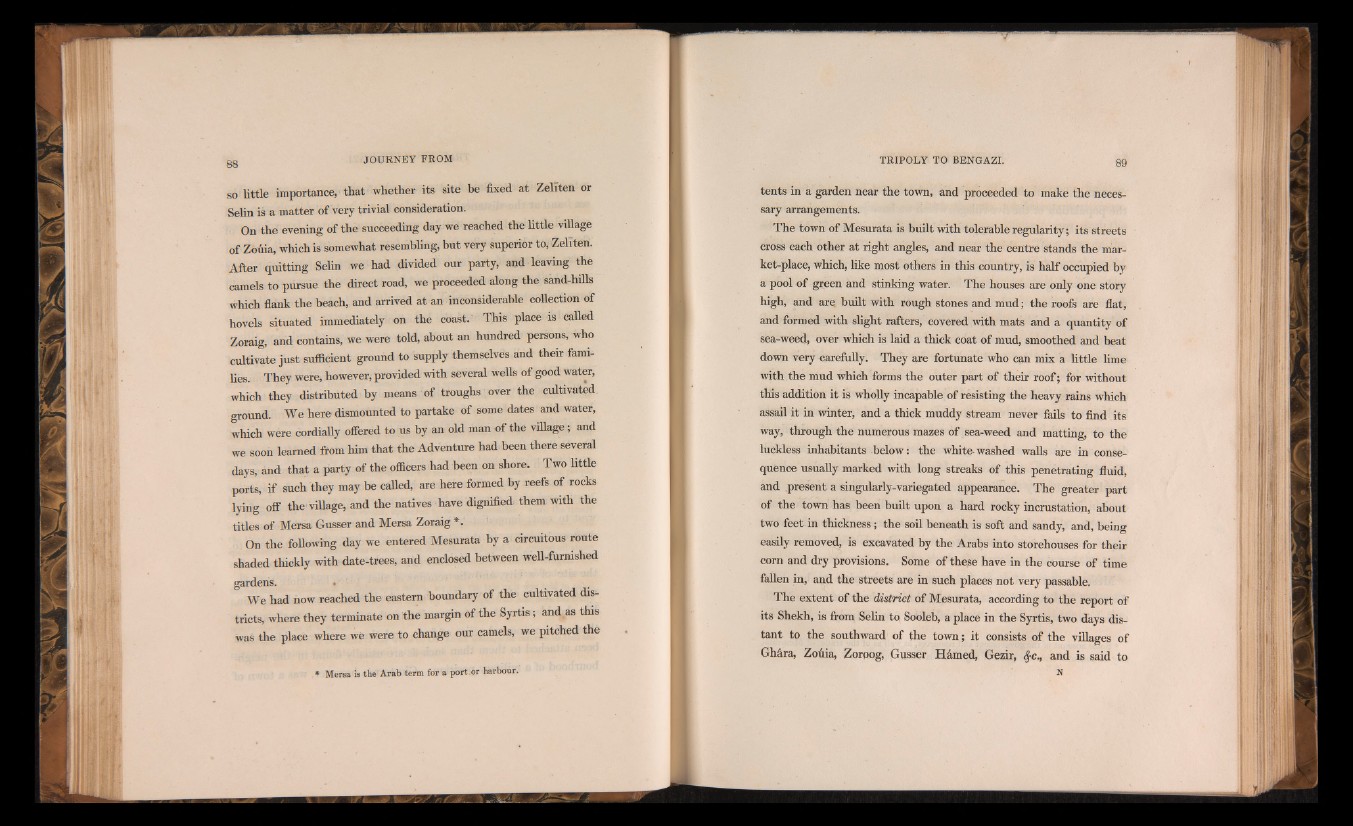
so little importance, that whether its site be fixed at Zeliten or
Selin is a matter of very trivial consideration.
On the evening of the succeeding day we reached the little village
of Zouia, which is somewhat resembling, but very superior to, Zeliten.
After quitting Selin we had divided our party, and leaving the
camels to pursue the direct road, we proceeded along the sand-hills
which flank the beach, and arrived at an inconsiderable collection of
hovels situated immediately on the coast.' This place is called
Zoraig, and contains, we were told, about an hundred persons, who
cultivate just sufficient ground to supply themselves and their families.
They were, however, provided with several wells of good water,
which they distributed by means of troughs over the cultivated
ground. We here dismounted to partake of some dates and water,
which were cordially offered to us by an old man of the village; and
we soon learned from him that the Adventure had been there several
days, and that a party of the officers had been on shore. Two little
ports, if such they may be called, are here formed by reefs of rocks
lying off the village, and the natives have dignified them with the
titles of Mersa Gusser and Mersa Zoraig *.
On the following day we entered Mesurata by a circuitous route
shaded thickly with date-trees, and enclosed between well-furnished
gardens.
We had now reached the eastern boundary of the cultivated districts,
where they terminate on the margin of the Syrtis; and as this
was the place where we were to change our camels, we pitched the
* Mersa is the Arab term for a port ,or harbour.
tents in a garden near the town, and proceeded to make the necessary
arrangements.
The town of Mesurata is built with tolerable regularity; its streets
cross each other at right angles, and near the centre stands the market
place, which, like most others in this country, is half occupied by
a pool of green and stinking water. The houses are only one story
high, and are. built with rough stones and mud; the roofs are flat,
and formed with slight rafters, covered with mats and a quantity of
sea-weed, over which is laid a thick coat of mud, smoothed and beat
down very carefully. They are fortunate who can mix a little lime
with the mud which forms the outer part of their roof; for without
this addition it is wholly incapable of resisting the heavy rains which
assail it in winter, and a thick muddy stream never fails to find its
way, through the numerous mazes of sea-weed and matting, to the
luckless inhabitants below: the white-washed walls are in consequence
usually marked with long streaks of this penetrating fluid,
and .present a singularly-variegated appearance. The greater part
of the town has been built upon a hard rocky incrustation, about
two feet in thickness; the soil beneath is soft and sandy, and, being
easily removed, is excavated by the Arabs into storehouses for their
com and dry provisions. Some of these have in the course of time
fallen in, and the streets are in such places not very passable.
The extent of the district of Mesurata, according to the report of
its Shekh, is from Selin to Sooleb, a place in the Syrtis, two days distant
to the southward of the town; it consists of the villages of
Gh&ra, Zofiia, Zoroog, Gusser H&med, Gezir, #c, and is said to